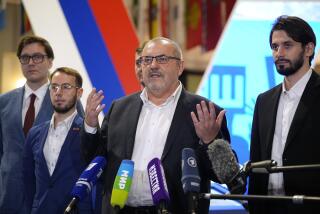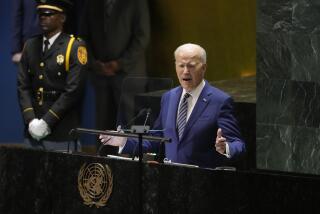Political Contenders Get Chance to Weigh In
- Share via
MOSCOW — Looking ahead to the post-Yeltsin era, President Clinton met Wednesday with a roomful of Russia’s leading politicians--including several likely candidates to be the next president--and urged them not to abandon democracy.
Speaking to such diverse figures as Communist Party leader Gennady A. Zyuganov and Krasnoyarsk regional Gov. Alexander I. Lebed, Clinton said Russia can continue on the path toward a market economy while still protecting the nation’s weak and poor.
“I come here as someone who considers himself a friend of your country, someone who deeply believes that in the century just ahead of us, America and Russia must be partners,” he told the unusual gathering.
Clinton, who took a few minutes to talk to each politician individually, appears to have left a favorable impression. Zyuganov, who has predicted that Russia could erupt into civil strife, said Clinton had listened to him carefully.
“I managed to share with him my view on everything that is happening in the country,” the Communist leader said. “He listened to me very attentively and asked a lot of questions. I am under the impression that in the last two days, the [Clinton] administration has understood a lot.”
Gov. Dmitri Ayatskov of the Saratov region was positively enthusiastic after the meeting. “I envy Monica Lewinsky,” he told reporters. “He’s a great guy.”
While the Russian politicians appeared happy to see Clinton, most of them are ready for their own president to depart the scene. President Boris N. Yeltsin, who has suffered from health problems for years, has appeared increasingly detached in recent months, and his moments of confusion in public have become more common. Some analysts say he would be ready to step down if he had a strong successor in place.
Although not directly spelled out, one goal of Clinton’s trip to Moscow was to begin the task of assessing Russia’s future leaders. Ranging from Communists to nationalists to pro-market liberals, the gathering Wednesday included some of Russia’s biggest political names--some of them rivals who are rarely together in one place.
Lebed, recently mentioned as a possible prime minister, said afterward that he had suggested to Clinton “measures to resolve the crisis. These measures are of an economic nature. And Clinton agreed with them.”
Grigory A. Yavlinsky, leader of parliament’s pro-market Yabloko faction, said he told Clinton that “in Russia, support should be given not to personalities but to institutions.”
Lebed, Yavlinsky, Zyuganov and Moscow Mayor Yuri M. Luzhkov, who also attended, are all expected to run for president when Yeltsin’s term expires in 2000. Acting Prime Minister Victor S. Chernomyrdin, also a likely contender, talked with Clinton earlier during the summit.
Clinton met the Russian leaders at Spaso House, the residence of U.S. Ambassador James F. Collins, spoke to the group for about 15 minutes, then worked the room, moving from one person to another for individual chats.
In his address, Clinton noted that the United States and Russia have cooperated in areas such as arms control and ending the conflict in Bosnia-Herzegovina, where U.S. and Russian troops serve side by side as peacekeepers.
He told the group that there was no one formula for economic success among the world’s democracies and that Russia needed to find its own way, but he added a warning. “For all our differences, all the countries that are succeeding have some things in common,” Clinton said. “They have tax systems that are fair and bring in revenues adequate to meet their spending requirements.”
A member of Clinton’s staff said the president came away from the meeting with an awareness of how much ideological distance there is between the various Russian leaders. “It reinforces how tough it is for Yeltsin to work with them,” the official said.
Sergei L. Loiko of The Times’ Moscow Bureau contributed to this report.
More to Read
Sign up for Essential California
The most important California stories and recommendations in your inbox every morning.
You may occasionally receive promotional content from the Los Angeles Times.










